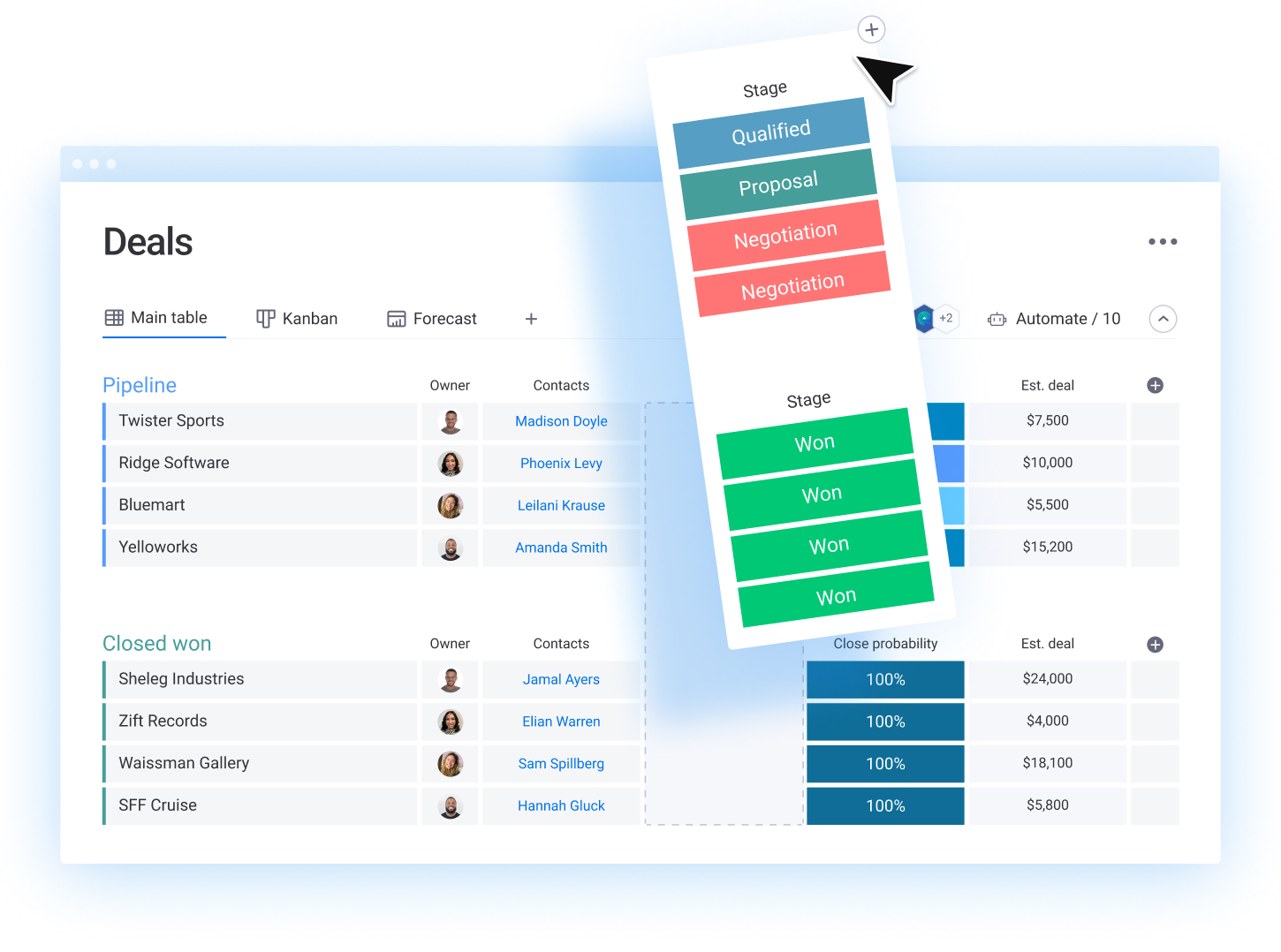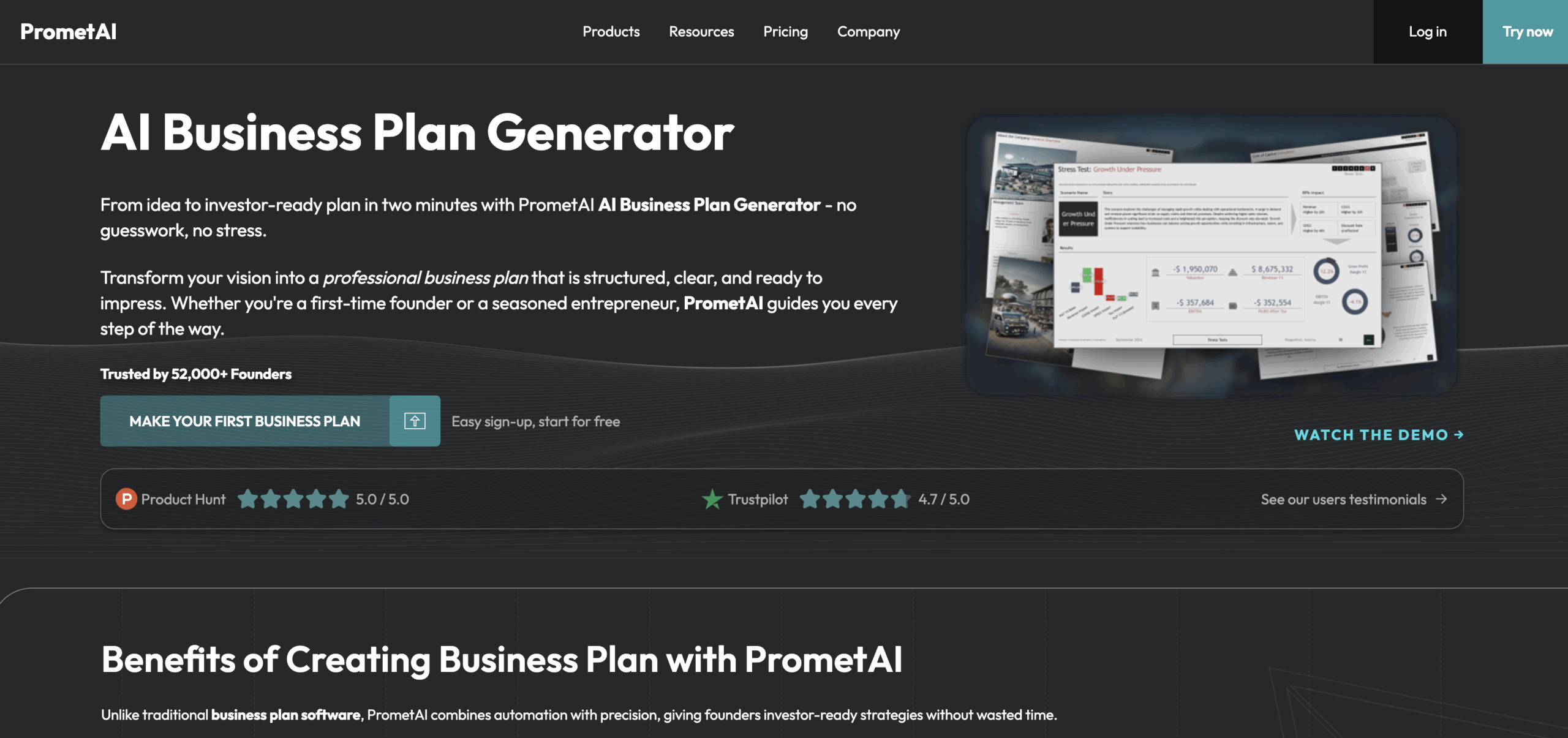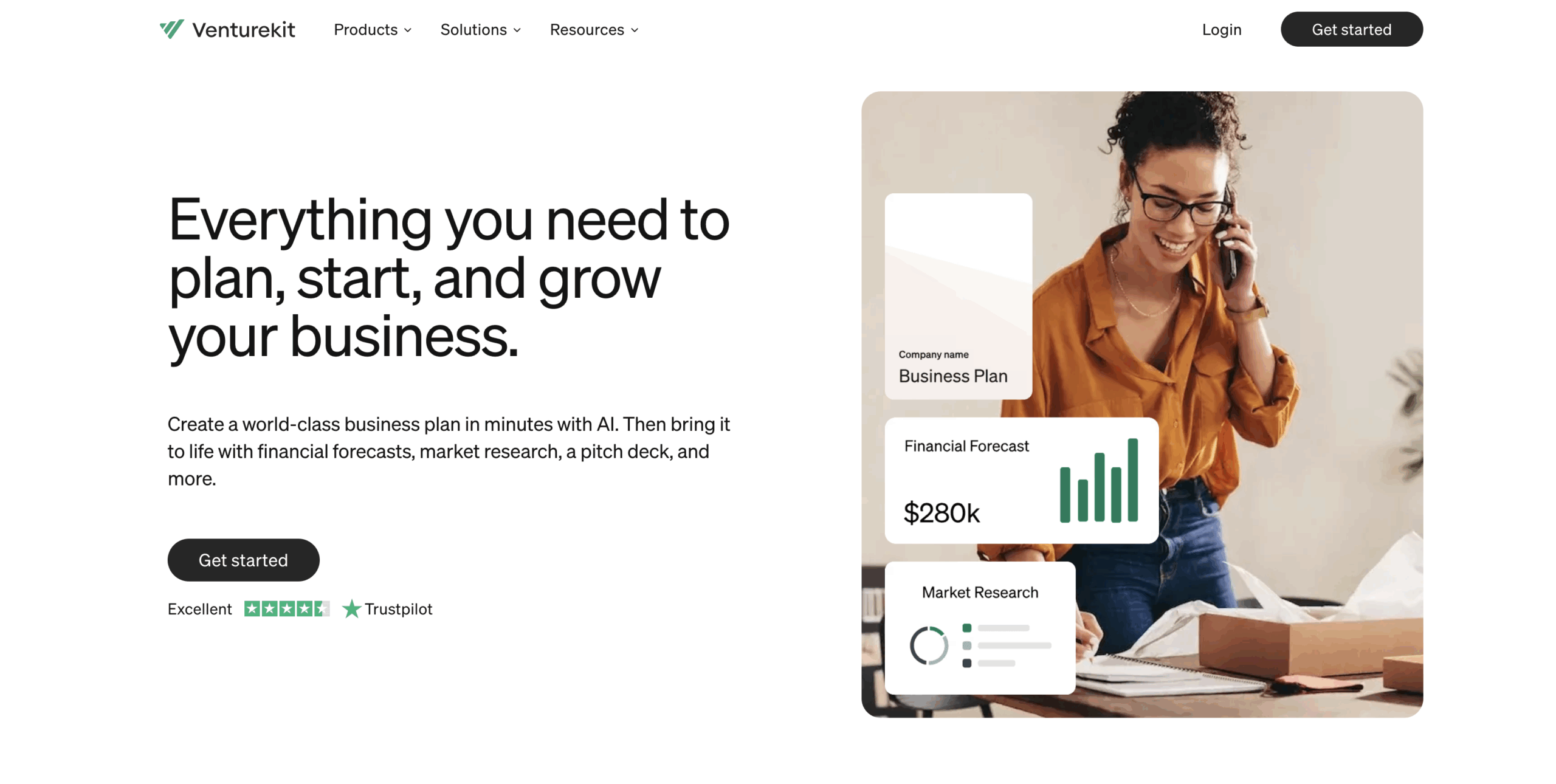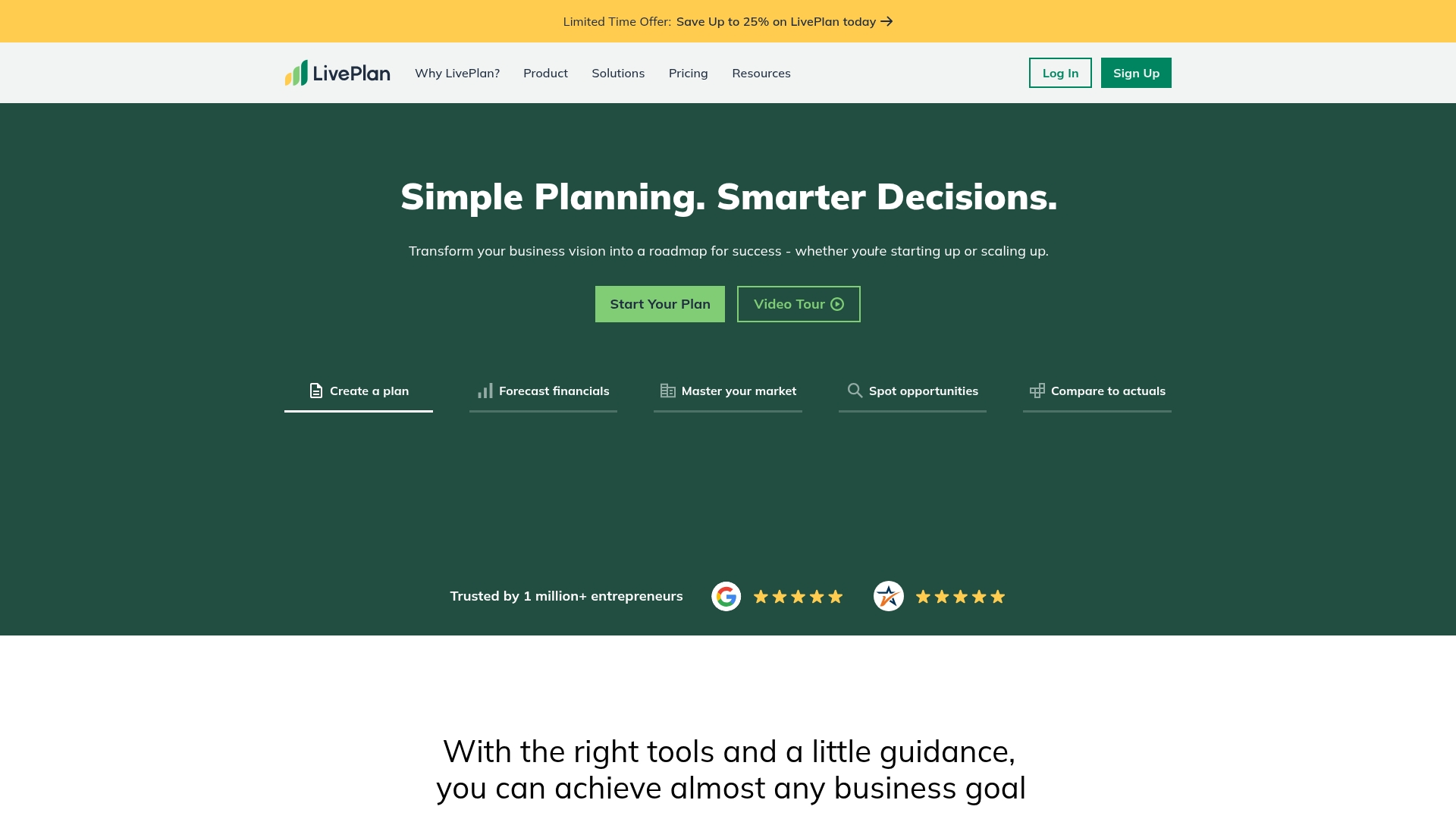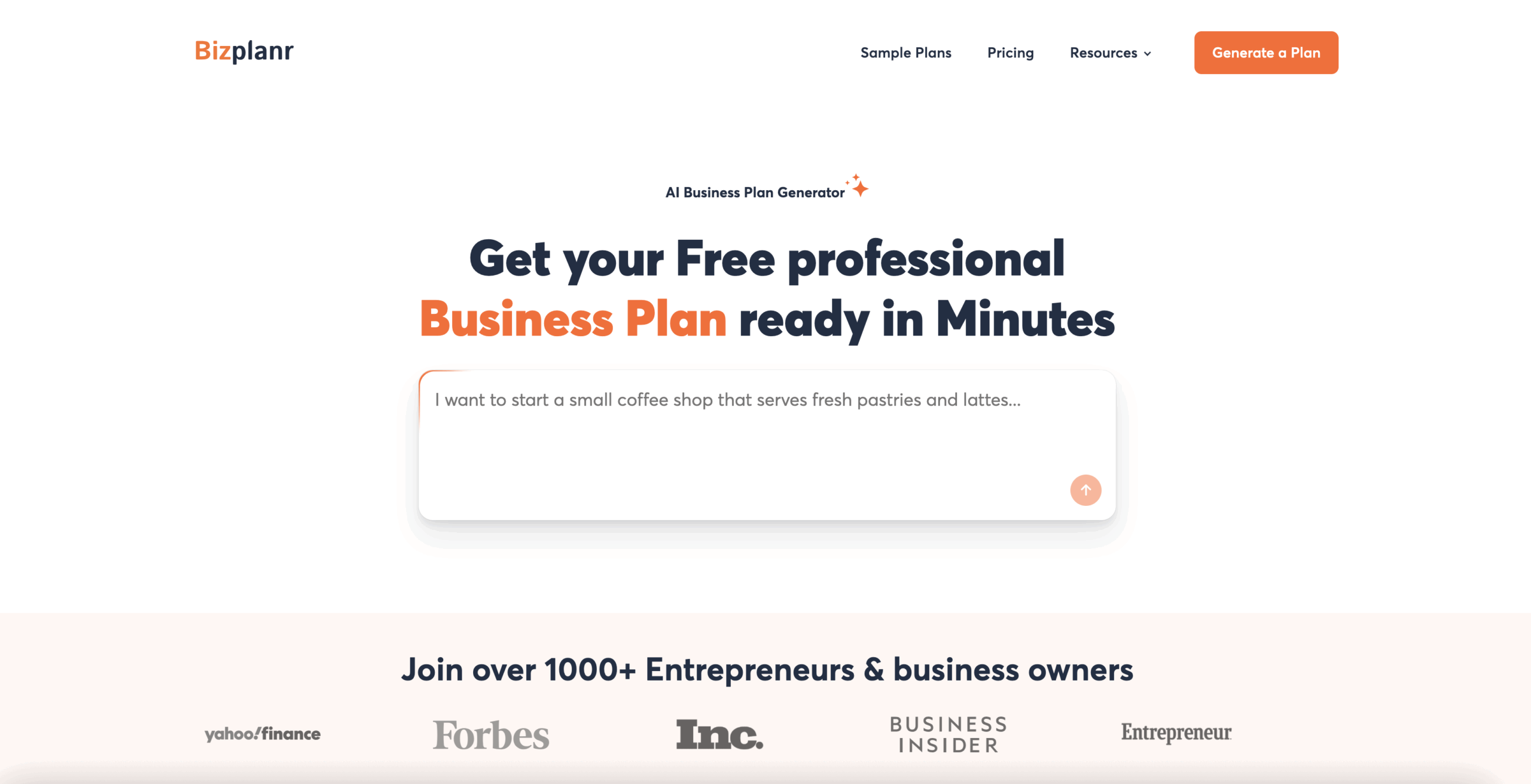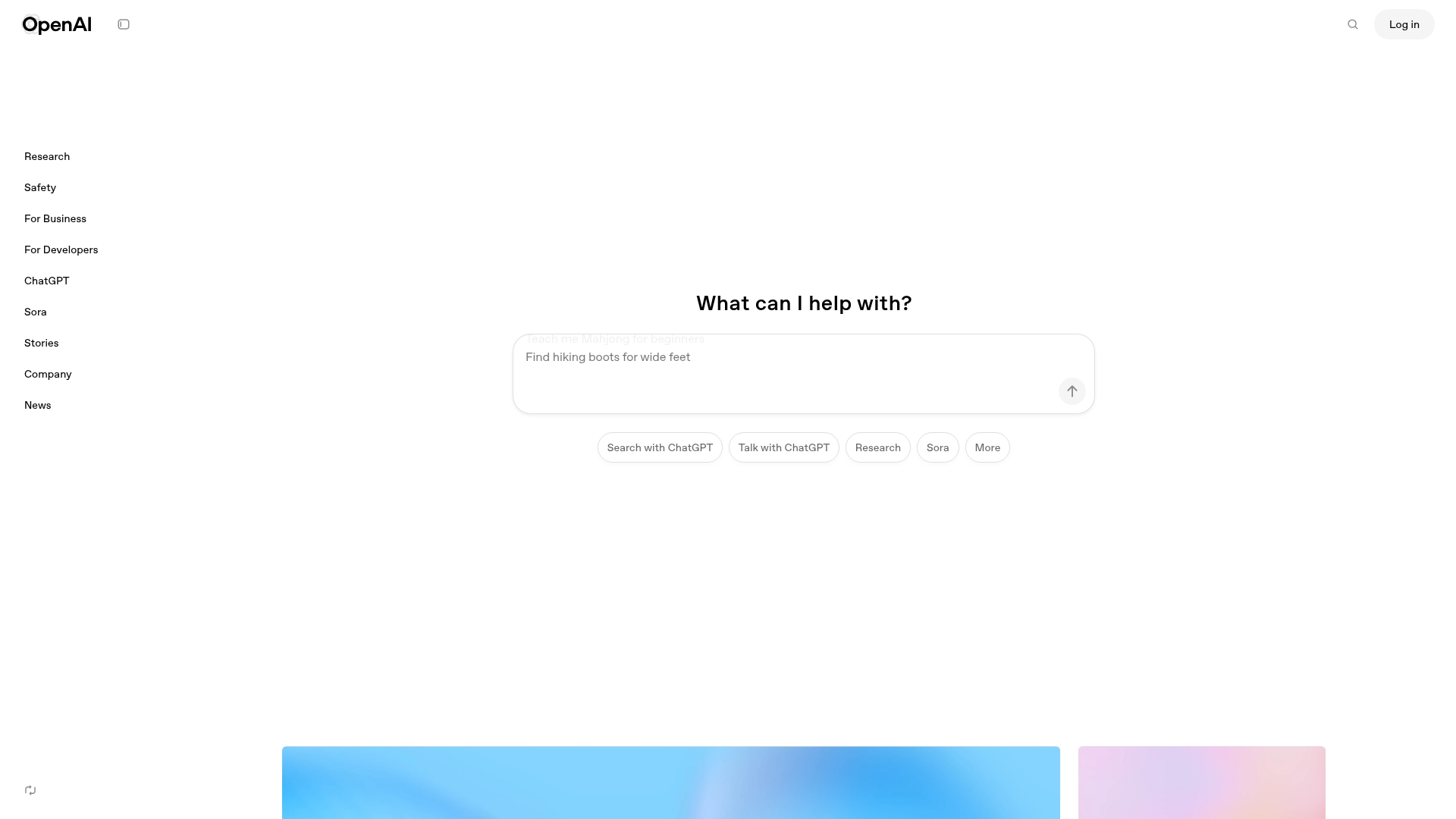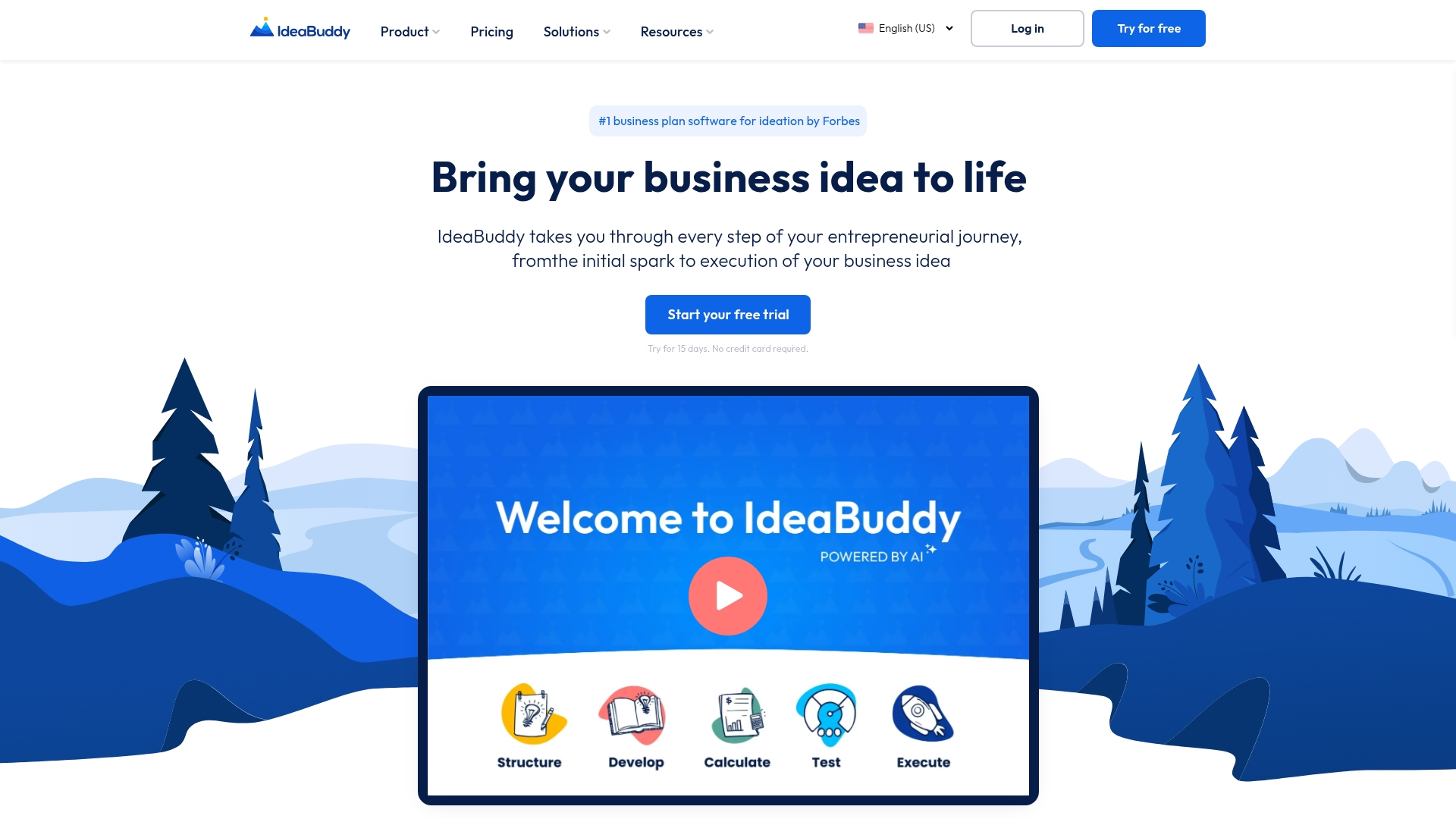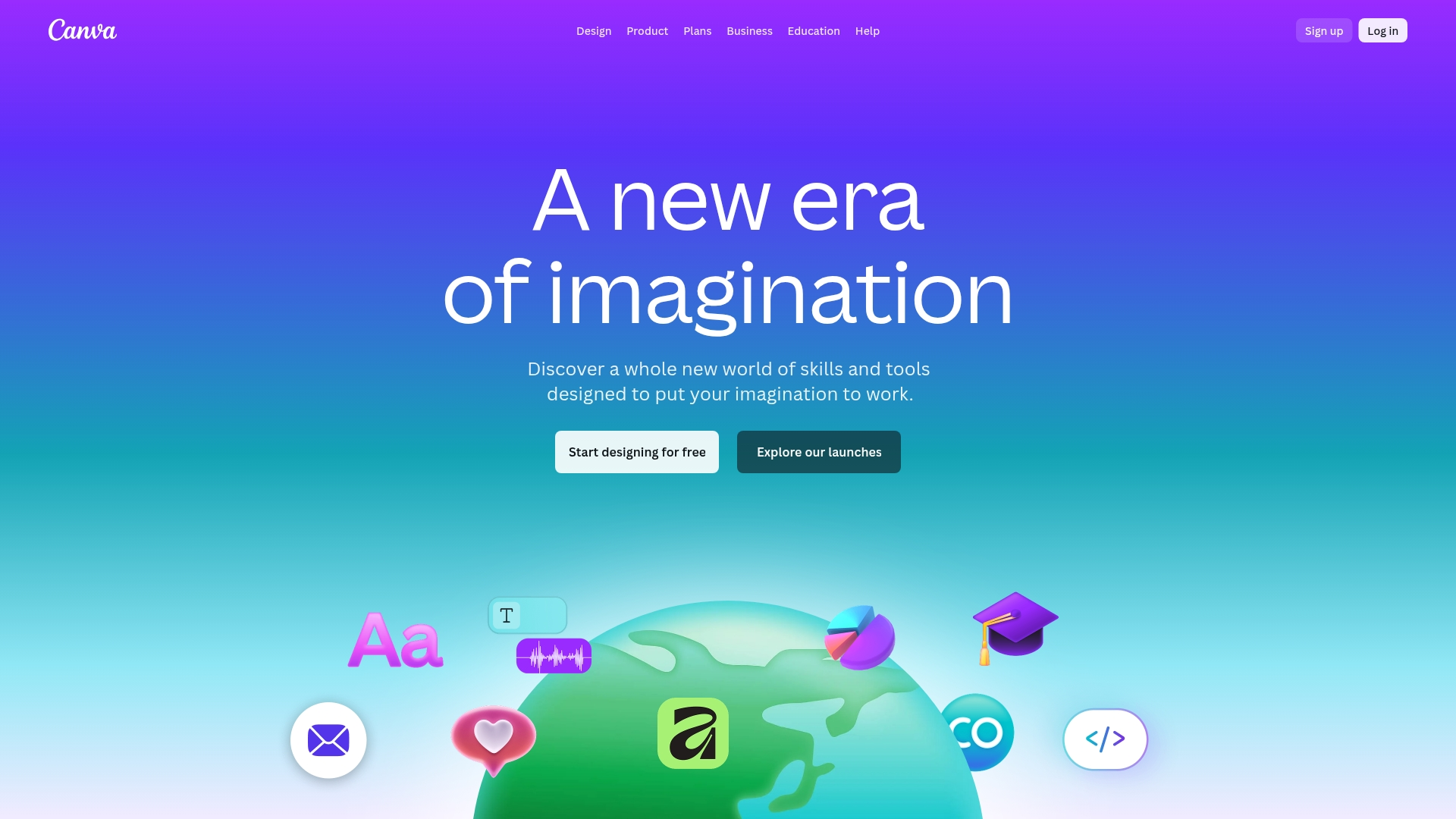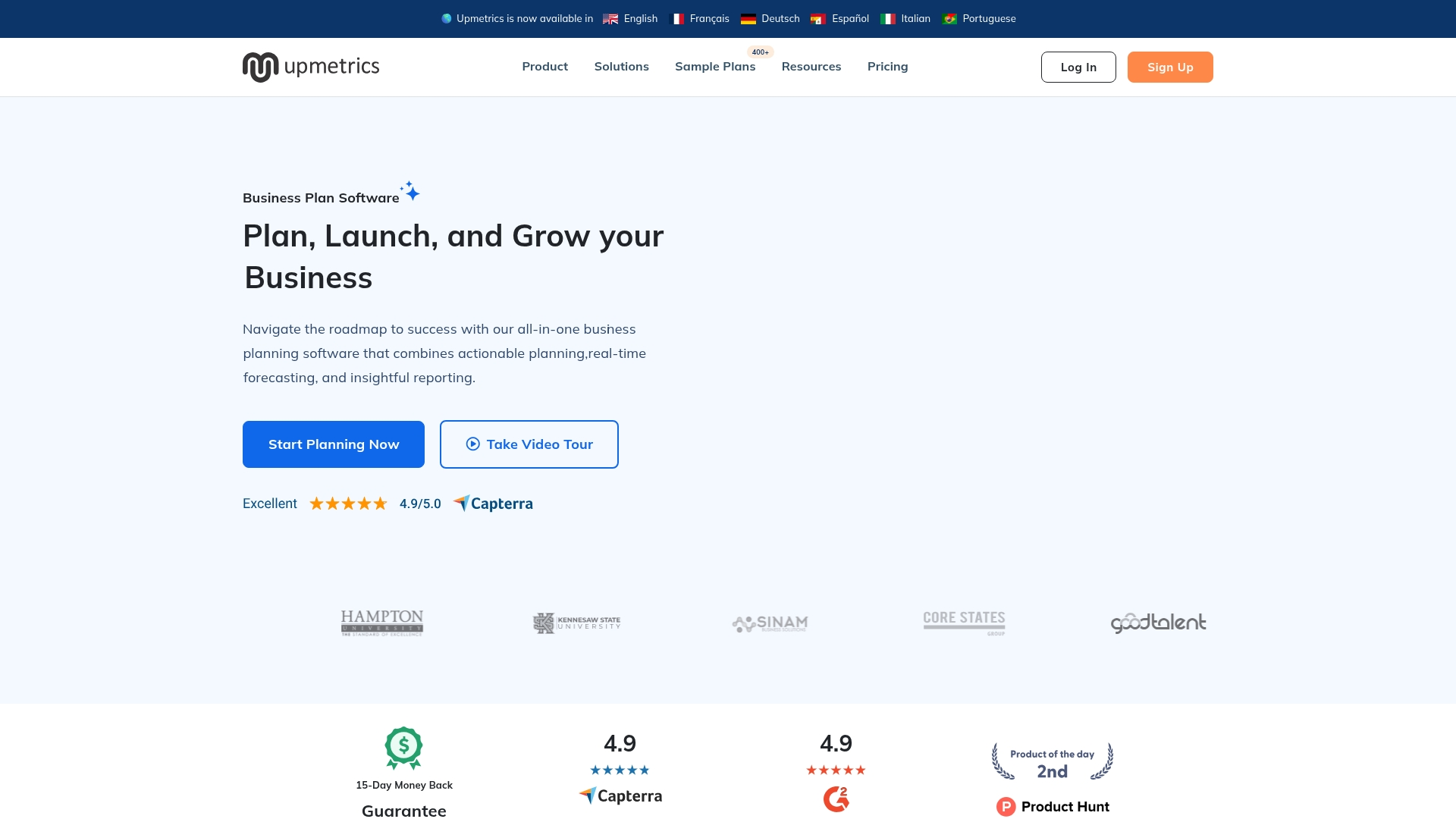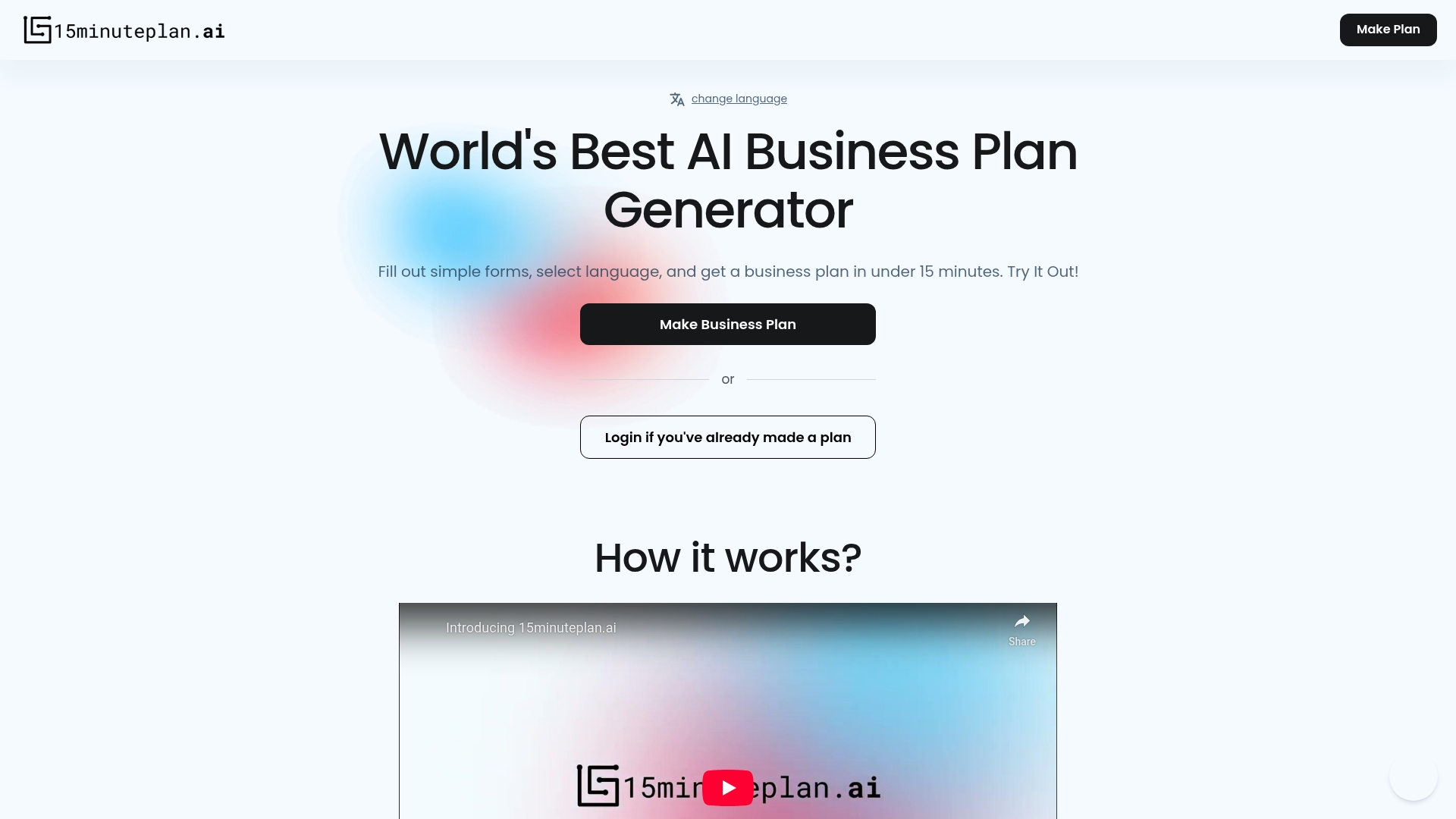A business plan is not a document writ10 once and filed away. It is, and must always be, a living playbook that should dynamically guide the team’s every strategic move and operational decision. While artificial intelligence dramatically accelerates the tedious mechanics of the writing process, like drafting sections and gathering initial data, its true, revolutionary power lies in bridging the fundamental gap between high-level strategy and daily execution.
The best AI for business plan generation does infinitely more than create a polished PDF; it actively builds and fuels an engine for scalable, measurable growth.
This essential focus on execution is precisely where integrated platforms clearly stand out from simple document generators. These next-generation tools don’t just produce a static blueprint; they embed the plan directly into the team’s working environment, transforming goals into trackable tasks, automated workflows, and real-time dashboards.
This comprehensive guide breaks down the top AI business plan generators on the market, comparing their core features, pricing structures, and critically, their ultimate ability to turn a high-level plan into a consis10tly actionable roadmap.
Key takeaways
- Plan as a playbook: a business plan is a dynamic, living playbook that must evolve with market changes, not a static document you file away.
- Execution is key: the true power of AI lies in its ability to bridge the gap between strategy and execution, transforming a writ10 plan into an actionable roadmap.
- Financial scrutiny: the best platforms produce financial projections capable of withstanding investor scrutiny and detailed, meaningful market analysis.
- Integrated platforms win: standalone tools generate documents, but integrated platforms, like the execution features found in monday work management, build an engine for growth by connecting strategy to daily workflows.
- Beyond the document: look for tools that offer collaboration and progress tracking, turning the plan into a continuously updated command center for the team.
What makes the best AI business plan generator?
Some AI business plan generators produce a pretty document that crumbles under scrutiny. Superior platforms understand that a plan isn’t a one-and-done PDF; it’s a living playbook for your entire team. It should function like a powerful CRM, adapting to how you actually work rather than forcing you into a rigid structure.
Look for a platform that delivers substance as quickly as it produces a draft. You need financial projections capable of withstanding investor scrutiny and industry insights that demonstrate you’ve done your homework. A generic template is a significant red flag; you want a plan that speaks the language of your specific market.
The true differentiator is what happens after the plan is built. The most effective platforms facilitate the transition from planning to execution with features for team collaboration and progress tracking.
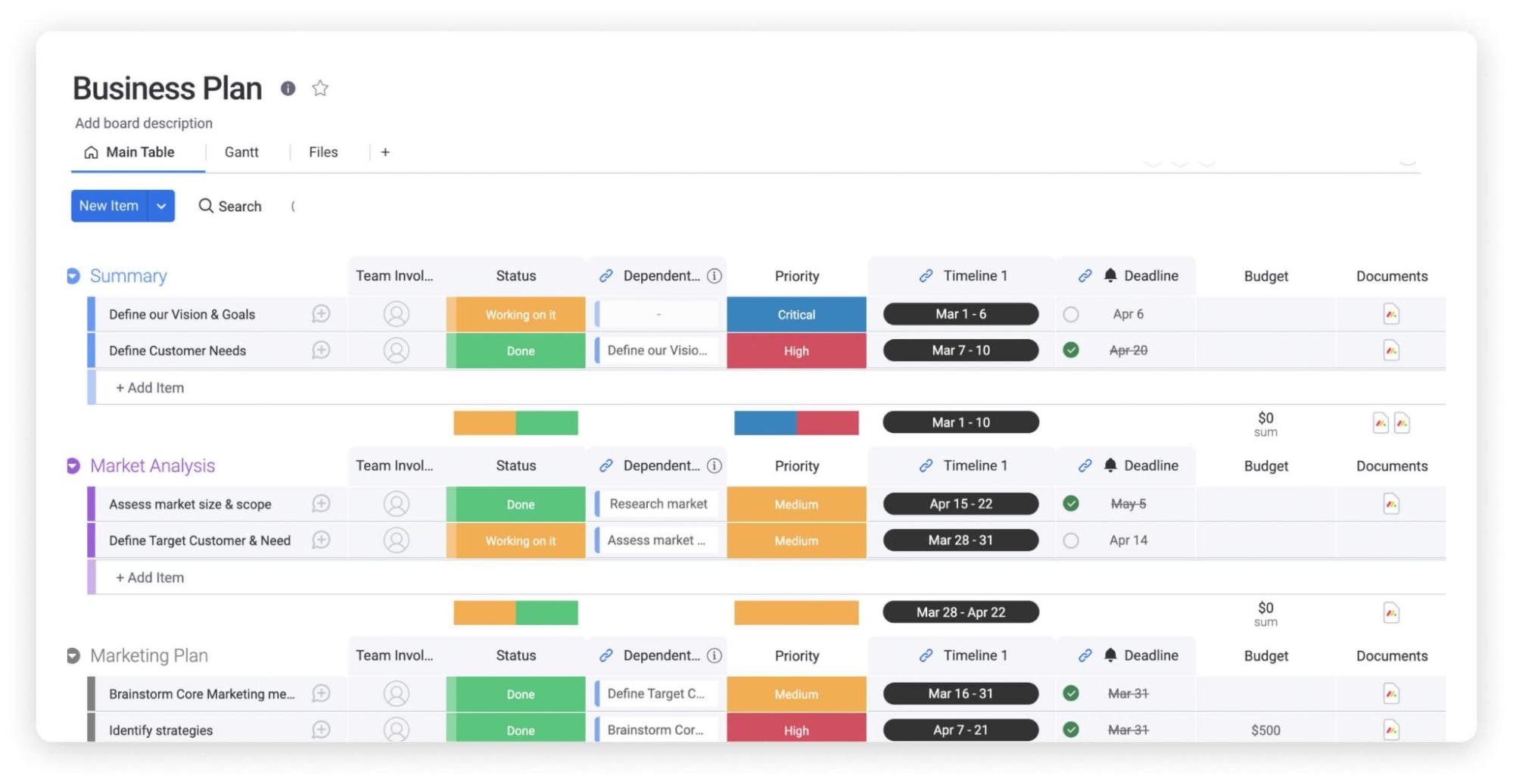
How we tested AI business plan generators
A business plan must do more than just check a box, it needs to win over investors and furnish an actionable roadmap. With that in mind, we put these AI generators through a rigorous testing process, using real-world scenarios for everything from SaaS startups chasing funding to retail shops planning their next expansion. Our goal was to determine which tools could deliver genuine strategic thinking, not just a dressed-up template.
Our methodology was straightforward: we fed every platform the same business concepts and data to generate full plans from scratch. We concentrated on the outputs that matter most: sharp financial projections, meaningful market analysis, and compelling pitch decks. A plan that can’t help you secure funding or make smarter decisions is ultimately just a paperweight.
The final showdown involved presenting these AI-generated plans to actual investors, founders, and consultants. Through mock pitch meetings and demanding strategy sessions, we separated the tools that hold up under real-world pressure from those that don’t.
10 best AI business plan generators compared
Too many business plans share a common fate: they end up forgot10 in a drawer. While AI is changing the game by accelerating the writing process, its real breakthrough is the ability to transform a static document into a living playbook your team can execute on daily.
Here’s our breakdown of the top solutions for 2026:
| Solution | Best for | Key AI features | Starting price | Standout capability |
|---|---|---|---|---|
| monday CRM | Plan execution & automation | AI plan generation, workflow automation | $10/user/mo | plans into actionable strategies |
| PrometAI | Fast plan creation | Instant plan drafts, AI market research | $29/mo | One-click business plan generation |
| Venturekit | Investor-ready plans | AI pitch decks, scenario modeling | $49/mo | Advanced financial modeling for VC funding |
| LivePlan | Small business planning | Guided AI templates, benchmarking | $20/mo | Industry-specific templates with live benchmarks |
| Bizplanr | Solopreneurs | AI plan builder, step-by-step guidance | Free/$19/mo | Simple interface for first-time founders |
| ChatGPT | Flexible custom planning | Conversational plan creation | Free | Highly customizable, open-ended plan generation |
| IdeaBuddy | Idea validation | AI idea scoring, business modeling | $15/mo | Early-stage idea validation and plan creation |
| Canva | Visual business documents | AI design, pitch deck creation | Free/$12/mo | Beautiful, investor-ready pitch decks |
| UpMetrics | Social impact businesses | AI impact analysis, reporting | Custom | Nonprofit and impact-focused plan generation |
| 15MinutePlan.AI | Agility and practicality | Rapid outlines | Free/$9/mo | 15-minute business plan outlines |
1. monday CRM
Instead of producing static documents, monday CRM builds a responsive execution engine for your business strategy. The platform merges AI-powered plan generation with real-time workflow automation, making it the definitive choice for teams focused on turning vision into measurable results.
Unlike traditional planning platforms that leave you with a finished document and no next steps, monday CRM seamlessly bridges the gap between strategy and execution.
Example:
The platform serves teams who need to create comprehensive business plans and immediately operationalize them with assigned owners, timelines, and trackable KPIs: all within a single unified platform, a key functionality of monday CRM.
Key features:
- Pre-built business plan templates (Best Business Plan, Lean Business Plan, One-Page Business Plan): with AI-powered con10t generation.
- Seamless conversion of plan elements into actionable workflows: with automated task assignments and timeline tracking.
- Real-time collaboration: through Workdocs with selective sharing permissions for investors and stakeholders.
Pricing:
- Basic: $12/month per user (billed annually).
- Standard: $17/month per user (billed annually).
- Pro: $28/month per user (billed annually).
- Enterprise: custom pricing (quote-only).
- 3-seat minimum: for all paid plans.
- AI credits: $0.01 per credit with one-time free credit grant.
- Annual billing: saves approximately 18%.
Why it stands out:
- Integrated execution management: combines business plan creation with execution management in one platform, eliminating the need to export plans to separate project management tools.
- AI-powered con10t and customization: features AI-powered con10t generation (templates, summaries, narratives) while maintaining the flexibility for the user to customize every element and column structure.
- Intelligent workflow automation: utilizes no-code automation recipes and pre-built workflows to convert static plan milestones into active, trackable project items with automatic assignments and notifications.
- Enterprise-ready scalability and security: provides enterprise-grade security (ISO 27001/27018) and proven scalability, supporting large teams across 200+ industries.
- Ex10sive integration ecosystem: offers native API access and popular enterprise integrations (Slack, Salesforce, Google Workspace) for unified workflow management and connecting to financial modeling tools.
2. PrometAI
For founders on a tight deadline, PrometAI condenses the business planning ordeal into a two-minute sprint. Its AI generates investor-ready plans from minimal input, specializing in ultra-fast creation combined with built-in valuation models. This makes it an ideal tool for entrepreneurs who need credible documentation for early-stage funding rounds without delay.
Example:
PrometAI helps busy entrepreneurs generate comprehensive business plans with integrated financial projections and valuation models in under two minutes.
Key features:
- One-click business plan generation: with industry-specific templates covering 700+ sectors.
- Built-in: DCF valuation models, scenario testing, and stress analysis for investor presentations.
- Strategy frameworks: including PESTEL, VRIO, and Porter’s Five Forces integrated into plan creation.
Pricing:
- Free Forever: $0/month (one plan, 25 AI requests, USD only)
- Basic: $55/month (PDF export, financial dashboards, three plans, 200 AI requests)
- Pro: $145/month (PowerPoint export, DCF valuation, plan sharing, six plans, 500 AI requests)
- Business: $445/month (for consultants, 56 plans, 5,000 AI requests)
- Annual subscriptions: save 55%, quarterly saves 18%.
- Enterprise solutions: available with custom pricing.
Considerations
- Premium pricing: sits well above mainstream alternatives like LivePlan ($20–40/month) and Upmetrics ($19–49/month).
- Some key features still in beta: including PowerPoint export and NDA templates; may affect reliability.
3. Venturekit
Venturekit is engineered to turn a startup concept into an investor-ready package in minutes. By combining automated financial forecasting with market research and pitch deck generation, the platform provides a comprehensive solution for entrepreneurs seeking funding or launching their first business.
Example:
Venturekit streamlines the business planning process for startups and small businesses by generating comprehensive, lender-ready business plans with integrated financial models and market insights.
Key features:
- AI-generated business plans: following SBA-approved formats with automated financial forecasting.
- Integrated market research tools: provide competitor analysis and industry trend tracking.
- All-in-one platform: including pitch deck creation, LLC formation services, and legal compliance support.
Pricing:
- Free: Up to three full business plans per month with basic features.
- Pro: $8/month (billed annually) or $19/month with three credits monthly.
- Agency: $38/month (billed annually) or $49/month with 20 credits monthly.
- Formation services: $169/year plus state filing fees for LLC setup.
- Registered Agent: $199/year add-on service.
Considerations
- Export options: limited to PDF format only, with no Word or other document formats available.
- Formatting issues and generic con10t: requires significant manual editing to personalize.
4. LivePlan
LivePlan shifts business planning from a chore to a strategic advantage by integrating AI-powered guidance with real-time industry benchmarking. The platform excels at creating SBA-approved, lender-ready plans while providing ongoing performance tracking, making it ideal for small business owners seeking funding or operational direction.
Example:
LivePlan serves as an end-to-end business planning system that combines guided writing, integrated financials, and performance dashboards to help entrepreneurs create credible plans and track their execution.
Key features:
- AI-powered “Help Me Write” and “Rewrite” functions: connect narrative sections with financial models and industry data.
- Automated three-statement financials: with up to ten “what-if” scenarios and real-time QuickBooks Online/Xero integration.
- SBA-approved formatting: with 550+ industry-specific sample plans and Vertical IQ benchmarking data.
Pricing
- Standard: $20/month (paid monthly).
- Premium: $40/month (paid monthly).
- Annual subscriptions: save 25%.
- LivePlan Expert add-on: $30/month for 1:1 video support.
- 35-day: money-back guarantee.
Considerations
- Limited Industry benchmarks: to U.S. markets only, which may not serve international businesses.
- Higher monthly pricing: compared to competitors like Upmetrics ($14–19/month) and limited Excel/Sheets import capabilities.
5. Bizplanr
Targeting first-time entrepreneurs and solopreneurs, Bizplanr reimagines business planning as a ten-minute mobile experience. This AI-powered platform delivers professional business plans without the complexity or cost of traditional software. Its standout feature is a completely free core offering combined with real-time market data integration.
Example:
Bizplanr serves entrepreneurs who need to quickly draft professional business plans for funding applications, strategic planning, or business validation without investing in expensive software.
Key features:
- AI-guided questionnaire: generates complete business plans in approximately ten minutes.
- Real-time market and industry data: automatically integrated into plan sections.
- Mobile-first design: includes iOS and Android apps plus web access.
Pricing:
- Bizplanr Core: Completely free
- Optional Upgrade to Upmetrics: Starter $7/mo, Premium $14/mo, Professional $37/mo (all billed annually)
- Add-ons: Extra workspaces $5/mo, team members $3/mo, white-labeling $185/mo
- 30% discount on paid Upmetrics plans for students and nonprofits
Considerations:
- Limited advanced features: like multi-year financial modeling or accounting integrations in the free version.
- Small review sample size: makes it difficult to assess long-term user satisfaction and platform reliability.
6. ChatGPT
Through its conversational AI, ChatGPT offers a uniquely flexible approach to business plan creation that adapts to your specific needs and industry. The platform combines deep research capabilities with collaborative document editing, making it perfect for entrepreneurs and teams who want flexibility without sacrificing thoroughness.
With enterprise-grade security and the ability to pull from your company’s internal knowledge base, it’s built for both solo founders and large organizations.
Example:
ChatGPT enables end-to-end business plan development from market research through financial modeling to collaborative document creation, all within a single conversational interface.
Key features:
- Deep Research: conducts multi-step web analysis with citations for comprehensive market and competitor insights.
- Canvas: provides collaborative document editing with version history and export capabilities to DOCX/PDF.
- Company knowledge integration: pulls from internal sources like Google Drive and Slack with permission-aware access.
Pricing:
- Free: $0/month with limited access to models and features.
- Plus: $20/month for individuals with expanded limits and advanced features.
- Pro: $200/month for power users with highest individual-level access.
- Business: $25/user/month (billed annually) or $30/month with secure workspace and admin controls.
- Enterprise: contact sales for custom pricing with ex10ded security controls and SLAs.
Considerations:
- Lengthy Deep Research processes: can take 5–30 minutes, which may slow down rapid iteration cycles.
- Availability limitations: some advanced features and regional integrations have limitations that could impact workflow consis10cy.
7. IdeaBuddy
IdeaBuddy focuses on the critical early stages of business planning, offering AI-powered idea validation and guided business modeling. The platform is designed to help entrepreneurs move from a simple concept to an investor-ready business plan, making it ideal for first-time founders and educational programs.
With multilingual support and automated financial projections, it removes much of the complexity from the planning process.
Example:
IdeaBuddy guides entrepreneurs through a storytelling approach to business planning, combining idea validation scoring with AI-assisted writing and financial modeling in one streamlined platform.
Key features:
- AI-powered idea validation scoring system: assesses business concept viability before full plan development.
- Step-by-step guided planning modules: convert completed inputs into professional business plan sections.
- Automated financial projections: with AI-supported revenue and expense estimation for non-financial users.
Pricing
- Free plan: basic access with 15-day trial period.
- Dreamer: $6/month (billed annually) for individual entrepreneurs.
- Founder: $12/month (billed annually) with enhanced features.
- Team Pro: $22/month (billed annually) includes collaboration tools and Whiteboard features.
- Annual billing: offers up to 60% savings with 15-day money-back guarantee.
- Enterprise and educational discounts: available through custom quotes.
Considerations
- Free business plan generator: produces simplified plans that require the full platform for detailed development.
- AI request credits: are limited per plan tier, with additional credits available for purchase.
8. Canva
Canva approaches business planning from a design-first perspective, turning the document creation process into a visually compelling storytelling experience. The platform combines AI-powered writing assistance with professional design templates, making it perfect for founders who need to impress investors with both substance and style.
With seamless conversion from business plan documents to pitch decks, Canva eliminates the usual back-and-forth between planning and presentation phases.
Example:
Canva’s Business Plan Maker workflow uses AI-powered Magic Write to draft plan sections while providing instant conversion to investor-ready presentations, all within one collaborative platform.
Key features:
- Magic Write AI: generates and refines business plan con10t with customizable brand voice integration.
- One-click “Docs to Deck” conversion: transforms writ10 plans into professional pitch presentations.
- Real-time collaboration tools: with commenting, task assignment, and enterprise-grade brand controls.
Pricing:
- Free: core design platform with basic Magic Studio features and templates.
- Pro: premium con10t and advanced features with 30-day trial (pricing varies by region).
- Business: $20/month per person with no seat minimum, higher AI limits, and advanced tools.
- Enterprise: custom quote-based pricing with 24/7 support and advanced security controls.
- Education (K-12): 100% free for verified educators with enterprise-grade security.
- Nonprofits: free Pro features for teams up to 50 users, 50% off additional seats.
Considerations
- Lacks specialized financial modeling capabilities: compared to dedicated business planning software.
- AI-generated con10t: requires manual review for accuracy and may need significant customization for complex business models.
9. UpMetrics
UpMetrics specializes in converting complex financial forecasting into investor-ready documents in minutes. The platform combines intelligent plan generation with comprehensive financial modeling, making it a powerful tool for entrepreneurs, startups, and small businesses seeking funding from lenders or investors.
Example:
UpMetrics streamlines business plan creation through AI-driven guidance and integrated financial forecasting, helping entrepreneurs produce professional, investor-ready plans without ex10sive business planning experience.
Key features:
- AI business plan generator: creates comprehensive plans in minutes using current market data and tailored questionnaires.
- Integrated financial forecasting: with three-statement modeling (PandL, cash flow, balance sheet) and scenario analysis.
- Multi-versioning capabilities: to create different plan variants for lenders, investors, and grant applications.
Pricing:
- Starter: $7/month (billed annually) or $9/month (monthly billing).
- Premium: $14/month (billed annually) or $19/month (monthly billing).
- Professional: $37/month (billed annually) or $49/month (monthly billing).
- Annual billing: saves up to 25%.
- 15-day: money-back guarantee.
- Add-ons: extra workspaces $5/month annually, additional team members $3/month annually, white-label option $185/month annually.
Considerations:
- No traditional free trial available: only a limited demo period and money-back guarantee.
- Starter plan: excludes AI features and limits forecasting to three years, requiring Premium tier for full functionality.
10. 15MinutePlan.AI
As its name implies, 15MinutePlan.AI is built for speed, condensing the entire business planning process into a lightning-fast, 15-minute workflow. The platform is designed for entrepreneurs, small business owners, and students who need quick, professional-quality plans for funding applications, loan requests, or project submissions without the complexity of traditional planning software.
Example:
15MinutePlan.AI serves entrepreneurs and small business owners who need professional business plans quickly for investor pitches, bank loans, or SBA applications without spending weeks on traditional planning processes.
Key features:
- Lightning-fast plan generation: complete business plans created in approximately 15 minutes through a guided 7-step process.
- AI-powered editing: “Talk to Plan” conversational editor allows users to refine and customize their plans using natural language.
- Multi-language support: plans can be generated in 15+ languages including English, German, French, Spanish, Japanese, and Arabic.
Pricing:
- Starter: $69 one-time (up to three plans, GPT-3.5 powered, approximately ten pages per plan).
- Professional: $99 one-time (up to ten plans, GPT-4 powered, approximately 20 pages per plan).
- Pricing not publicly displayed: must be verified at checkout.
Considerations
- Limited depth: compared to comprehensive planning platforms, with po10tial for generic con10t without careful user input and editing.
- Strict refund policy: requiring users to annotate at least ten sections and justify five valid issues to qualify for even partial refunds.
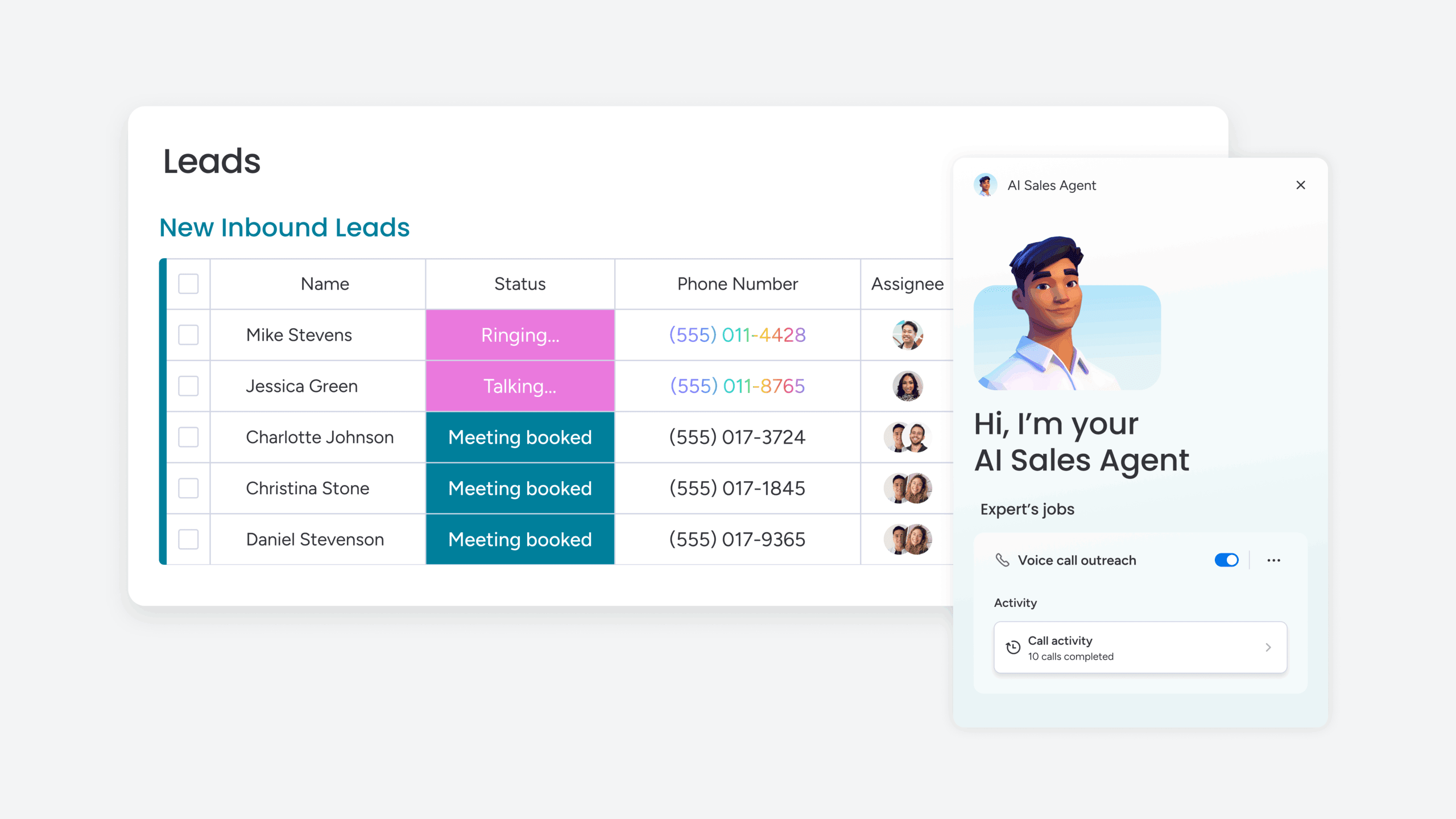
AI business plan generator pricing guide
Understanding the true cost of AI business plan generators requires looking beyond the initial price tag. The strategic decision is not simply about free versus premium access; it is about determining the required output — whether a quick sketch or an investor-ready blueprint that instills confidence in the team.
Most tools operate on a freemium model, offering basic plan outlines at no cost to facilitate a starting point. Upgrading unlocks the more powerful, value-driving features: deep financial modeling, industry-specific data integration, and collaboration tools that elevate a static document into a team-wide game plan.
This difference really highlights the divide: standalone generators produce a document, but integrated platforms like monday CRM build the entire growth engine. The objective shifts from merely creating a static plan to connect it directly to the sales pipeline, enabling progress tracking, and providing the whole team with a single source of truth.
Try monday work managementHow do AI business plan generators work?
A brilliant business idea must not remain an abstract concept. AI plan generators function as a strategic partner, transforming the initial vision into a polished, data-backed plan, saving the team weeks of manual effort.
The process is straightforward: the user provides the core concept and goals, and the AI assumes the heavy lifting. It instantly analyzes relevant market data and structures a professional framework. This rapid generation results in a comprehensive first draft built on real market analysis and financial modeling, providing the confidence necessary for high-stakes presentations.
This is achieved through three core steps: entering the business concept, AI structuring and analyzing the information, and final user customization and refinement.
Step 1: enter your business concept
You kick things off by answering a series of direct questions about your business concept, target audience, and key goals. Think of it as a guided brainstorm where your input builds the foundation for the entire plan.
Step 2: AI structures and analyzes your information
This is where the AI puts in the work. It takes your input and instantly generates SWOT analyses, market research, and financial projections by cross-referencing vast datasets of industry trends and benchmarks.
Step 3: customize and refine your plan
The AI delivers a powerful draft, but you’re always in the driver’s seat for the final version. Easily refine the tone, tweak the financial forecasts, and inject your unique brand voice to make the plan unmistakably yours.
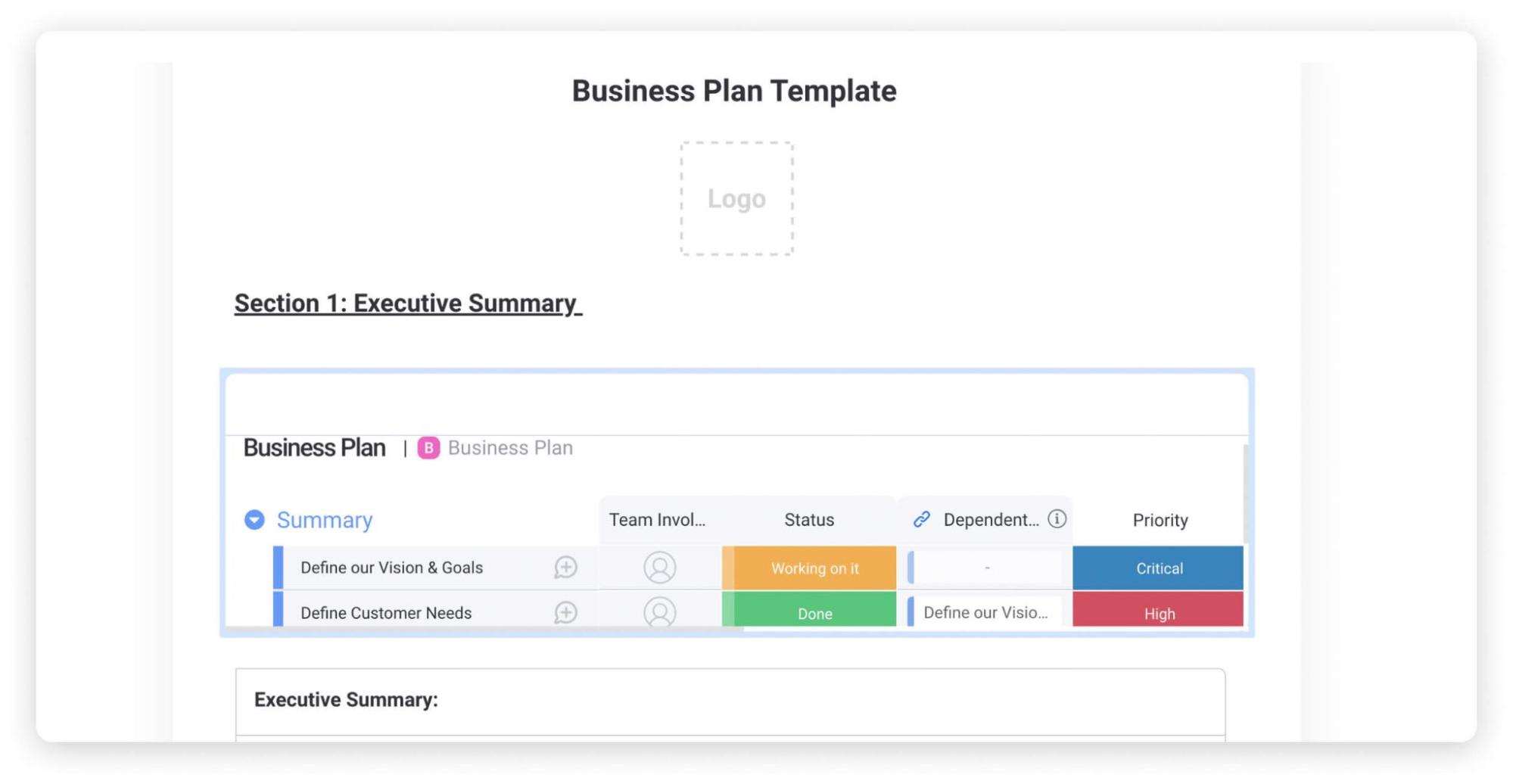
Can AI create fundable business plans?
An AI-writ10 business plan can absolutely help you get funded, but with a critical caveat: investors fund solid businesses, not just fancy documents. The most effective approach combines AI’s narrative horsepower with your team’s genuine market knowledge and hard data.
Generic templates are a fast track to the rejection pile. A winning plan is built on your actual business metrics, pulling live data straight from your CRM on everything from sales pipelines to customer acquisition costs. That is how you build a story investors can’t ignore.
Ultimately, the tool you use is less important than having the right answers. Can you prove people want what you’re selling, and are your financials rock-solid? AI can structure the pitch, but your strategy and data must deliver the knockout punch.
Who benefits most from AI business planning?
AI business planning tools offer a significant advantage for any entity that requires speed without sacrificing quality. While these platforms provide a boost across the board, they deliver an undeniable edge to specific groups by directly tackling their biggest and most frustrating roadblocks.
- First-time entrepreneurs: they can bypass “blank page paralysis” and immediately focus on building. AI-powered guidance provides the guardrails necessary to create a polished, professional plan, building the confidence required to articulate their vision and satisfy investor expectations.
- Busy business owners: they reclaim critical time by automating the administrative grunt work, allowing for a focus on high-level strategy instead of manual spreadsheets.
- Consultants: they can scale their impact by delivering top-tier plans faster, increasing client throughput and efficiency.
- Growing companies: they gain the agility required to pivot quickly, ensuring that teams remain aligned and responsive no matter how fast the market changes.
Business plans you can create with AI
An AI business plan generator is a strategic co-pilot, not a cookie-cutter template machine. It understands that an investor pitch requires a completely different emphasis than a bank loan application. The right AI tool crafts the right document for the right audience, every single time.
This targeted customization for every stakeholder is where the real power lies. An AI generator knows that VCs are hunting for scalability while a banker wants to see solid cash flow. It automatically tunes the language and financial focus to ensure your plan resonates with whoever is reading it.
Whether you need a sharp investor deck or a deep-dive strategic plan to rally your team, AI handles the heavy lifting so you can stay focused on the big picture.
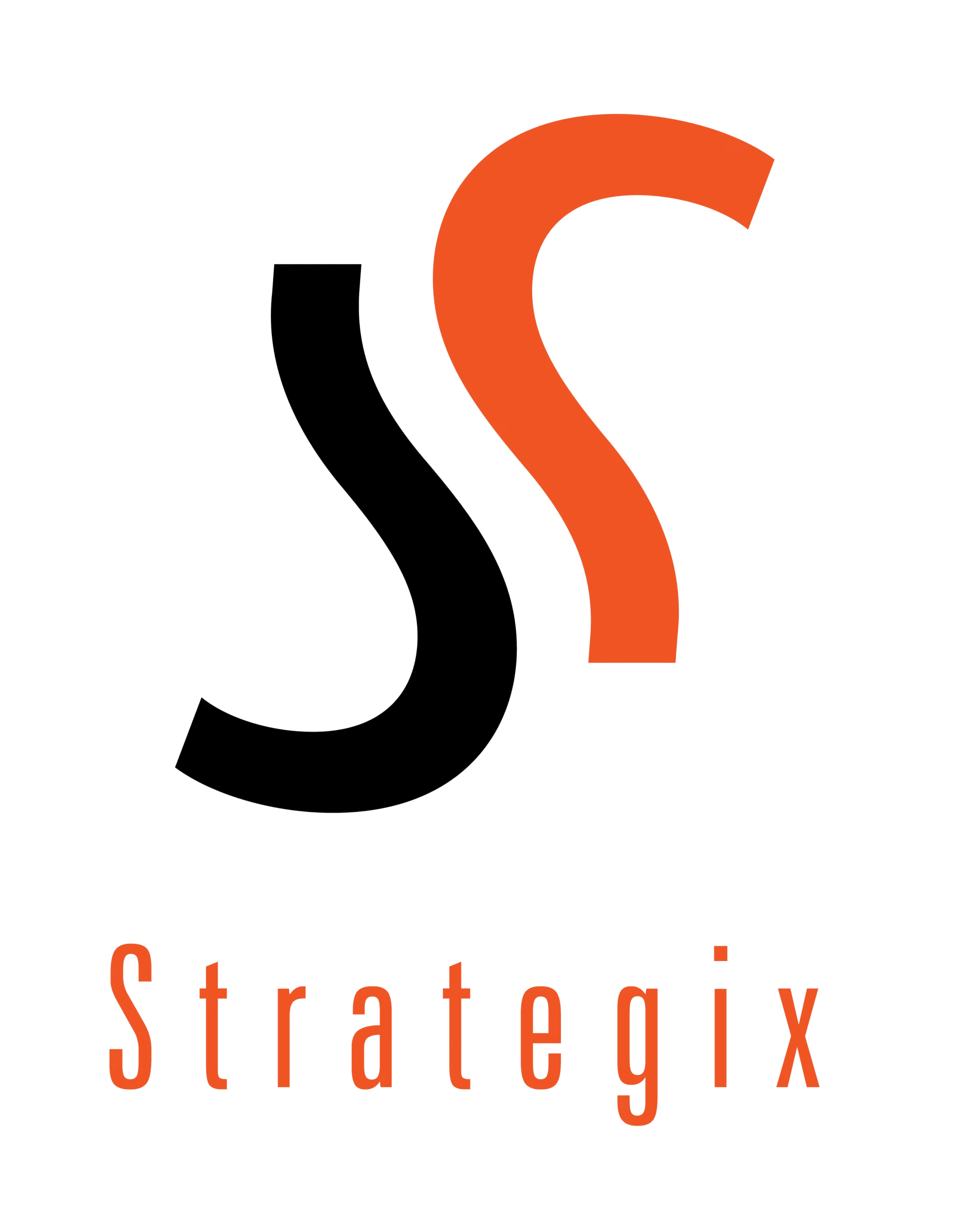
“With monday CRM, we’re finally able to adapt the platform to our needs — not the other way around. It gives us the flexibility to work smarter, cut costs, save time, and scale with confidence.”
Samuel Lobao | Contract Administrator & Special Projects, Strategix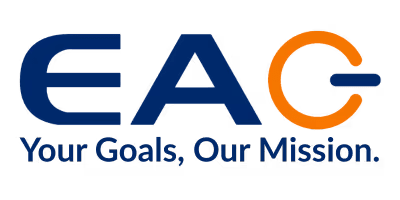
“Now we have a lot less data, but it’s quality data. That change allows us to use AI confidently, without second-guessing the outputs.”
Elizabeth Gerbel | CEO
“Without monday CRM, we’d be chasing updates and fixing errors. Now we’re focused on growing the program — not just keeping up with it."
Quentin Williams | Head of Dropship, Freedom Furniture
“There’s probably about a 70% increase in efficiency in regards to the admin tasks that were removed and automated, which is a huge win for us.“
Kyle Dorman | Department Manager - Operations, Ray White
"monday CRM helps us make sure the right people have immediate visibility into the information they need so we're not wasting time."
Luca Pope | Global Client Solutions Manager at Black Mountain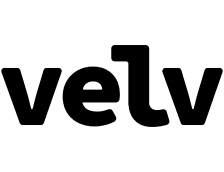
“In a couple of weeks, all of the team members were using monday CRM fully. The automations and the many integrations, make monday CRM the best CRM in the market right now.”
Nuno Godinho | CIO at VelvHow to execute your AI business plan
An AI-generated business plan is a powerful start, but the plan itself doesn’t close deals: your team does. The real challenge isn’t the strategy; it’s bridging the gap between big-picture goals and the daily hustle of your sales floor.
Let’s turn that brilliant plan into your team’s playbook, making it a living roadmap for hitting your numbers:
Step 1: convert projections to sales pipelines
First, translate those large-scale revenue projections into tangible targets your team can actually hit. Break down the annual goal into quarterly milestones and individual quotas, giving every rep a defined path to victory. With modern platforms like monday CRM, each goal maps directly to a visual sales pipeline, so everyone knows exactly what they’re chasing and how to get there.
Step 2: set up team accountability dashboards
Goals should never be a mystery. Put the scoreboard where everyone can see it. Live dashboards transform abstract targets into a daily scorecard for the whole team, tracking everything from lead conversion to quota attainment. When progress is this visible, accountability feels less like a top-down mandate and more like a shared mission.
Step 3: implement AI-powered progress tracking
Let your systems handle the heavy lifting of monitoring progress so your team can focus on selling. AI-powered tracking acts as an early warning system, automatically flagging slowdowns in your pipeline or dips in win rates before they become major problems. This isn’t about micromanaging; it’s about gaining the foresight to make smart adjustments and keep the plan on track.
Step 4: create feedback loops for plan updates
An annual plan can become obsolete in a single quarter, so your execution must be agile. Build in regular feedback loops where the team can review performance data, discuss what’s working, and adjust goals together. This keeps your plan from becoming a dusty document, turning it into a dynamic strategy that evolves with the market.
Step 5: scale with digital workforce automation
Scaling your revenue shouldn’t mean scaling your team’s admin work. Automate repetitive tasks — like lead assignments, follow-up emails, and reporting — to free up your reps for what they do best: building relationships and closing deals. This is how you grow faster without burning out your best people.
How monday CRM excels at business plan execution
A robust business plan loses its value if the team lacks the means to execute it effectively. While most Customer Relationship Management (CRM) systems store data proficiently, they often fail to connect the high-level strategy to the daily operational tasks, requiring teams to constantly switch between various tools.
Those challenges are addressed directly by the intelligent monday CRM platform that serves as the bridge between strategic planning and execution.
- Strategy-to-action bridge: the platform transforms the static plan into actionable items, automating administrative tasks and providing the team with a defined path forward within a single, unified workspace.
- Unified workspace: unlike typical CRMs that only hold the plan as a document, monday CRM integrates the plan with daily work, eliminating the need to juggle multiple disconnected tools.
- Dynamic and adaptable strategy: the system facilitates the creation of a living strategy that adapts in real time. When plan goals and performance data reside together, teams gain the focus and confidence required to consistently exceed targets.
The content in this article is provided for informational purposes only and, to the best of monday.com’s knowledge, the information provided in this article is accurate and up-to-date at the time of publication. That said, monday.com encourages readers to verify all information directly.
Frequently asked questions
How long does it take to create a business plan with AI?
The time it takes to create a business plan with AI can be as little as a few minutes for a comprehensive first draft. The total time, from 15 minutes to a few hours, depends on how much you refine and customize the initial output.
Are AI-generated business plans accepted by investors?
Yes, investors accept AI-generated plans as long as they are well-customized, data-backed, and tell a compelling story. The quality of the con10t matters more than the tool used to create it.
Can I edit my AI business plan after it’s created?
Yes, nearly all AI business plan generators provide full editing capabilities. This allows you to continually refine your plan as your business strategy evolves.
How much do AI business plan generators cost?
Costs range from free basic tools to premium subscriptions that are typically between $10 and $50 per month. Pricing is based on access to advanced features like financial modeling and industry-specific templates.
Which industries work best with AI business planning?
AI business plan generators are effective for nearly every industry, including SaaS, retail, and consulting. They are especially useful for businesses with clear revenue models and established market frameworks.
How do I turn my AI business plan into action?
Bridge the gap between planning and execution by integrating your plan into your daily operations. A platform like monday CRM turns your projections into actionable sales pipelines and automated workflows, ensuring your team stays aligned with growth targets.
Which AI models for enterprise CRM integrations offer genuine cost savings rather than just marketing hype?
Real savings come from Agentic AI and Small Language Models (SLMs). While large models are popular, smaller models (like Llama or Mistral) are up to 80% cheaper for high-volume tasks like lead cleaning. For maximum ROI, use monday CRM’s AI features to build "Agentic" workflows—this allows the AI to actually execute tasks, like updating deal stages and sending notifications automatically, rather than just generating text.

